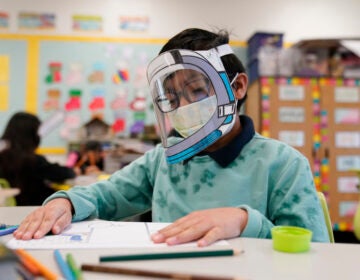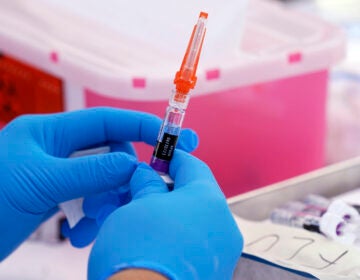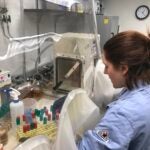Think you’re young and safe from COVID-19? Your immune system might disagree
In some cases, patients have been shown to develop an immune reaction called the cytokine storm. Youth can’t protect you from it.

Spring break revelers party on the beach, Tuesday, March 17, 2020, in Pompano Beach, Fla. (Julio Cortez/AP Photo)
Think COVID-19 strikes only the elderly and those who already have health issues? You’re not seeing the whole story.
People under the age of 40 account for more than half of the 67 COVID-19 cases reported in Philadelphia, according to Friday’s briefing by the city Department of Public Health.
In a separate news briefing, Pennsylvania Health Secretary Rachel Levine cited a Centers for Disease Control and Prevention analysis showing that 20% of the people in the United States with COVID-19 who have been hospitalized were between ages 20 and 44. “We are seriously concerned that individuals in the 20-44 age range are not heeding the message to stay home and are creating an unnecessary risk to themselves and to others,” Levine said.
You really can’t predict who — young or old, whether it’s you, or someone you love, or even someone you sneeze on at the grocery store — might have a hidden genetic disposition that causes the immune system to over-respond to the coronavirus, said Ross Summer, a professor of medicine at Thomas Jefferson University, where he also directs the interstitial lung disease program.
“I mean, it’s a total lottery about how your body responds to a virus,” Summer said.
If you over-respond, your immune system experiences something ominously called a cytokine storm, and everyone — even twenty-somethings on spring break — is equally at risk.
In the setting of infections, “it is very difficult to predict who might be predisposed to an overactive immune system,” said Julie Fitzgerald, an attending physician in the pediatric intensive care unit and bioresponse team at Children’s Hospital of Philadelphia.
Imagine a room of 10 people. Could you guess who had a peanut allergy? Probably not.
As Summer explained it, our bodies respond differently to all kinds of things, so why should viruses be an exception? He gave allergies as an example.
“Everybody in the population is exposed to pollen, everyone’s exposed to cat dander that gets into the lung, you know, everybody’s exposed to different things, but only a small population responds to the point where they get asthma or they get allergies.”
And a lot of this comes down to you, your medical history and your genetics.
Some cases of COVID-19 seem to trigger this dangerous immune cascade. Autopsy results from cases in China indicate that in some severe cases, an inflammatory cytokine storm may have occurred. Cytokine storms were also seen in MERS and SARS, two previous viral outbreaks in the same family as this coronavirus.
At best, cytokine storms sound like a meteorological phenomenon; at worst, like a B-list wrestler. But what are they, really?
Cytokines are small signaling proteins that work to modulate the immune system. They act as messengers, turning on new signaling cascades that make more cytokines. Too many of these messengers can overwhelm the body, leading to low blood pressure, possible organ damage, and sometimes death.
Christopher Hunter, a professor at the University of Pennsylvania School of Veterinary Medicine who studies immunology, said that the term cytokine storm refers to “collateral damage from a too-strong immune response.” It can happen in response to any infection, and to some genetic therapies.
One consequence of a cytokine storm can be respiratory failure. And cytokine storms are equal opportunity offenders: In the case of COVID-19, they don’t seem to be associated with age.
“While the vast majority of young people are going to be fine, we’re seeing reports here and there of when this isn’t going to be the case,” said Hunter.
According to Summer, the lung disease expert from Jefferson, what really dictates somebody’s response to a lung infection, whether it’s a viral or a bacterial infection, “is largely dictated by your body’s response to that organism.”
Your prior health holds no clues. Even if you’ve never had the flu, this virus might be the thing that causes your immune system to overreact.
But there are tests to help physicians look for cytokine storms, and treatments have been developed that help block them.
A lot is known about cytokine responses from close monitoring of patients undergoing CAR-T, a genetic therapy used for cancer. CHOP’s Julie Fitzgerald said that in CAR-T patients, a cytokine storm might look like a fever, high blood pressure, low oxygen and maybe even organ failure. Until more COVID-19 patients are treated and more research is done, there won’t be a good characterization of what a cytokine storm might look like for this coronavirus. =
Patients with COVID-19 who go on to develop a cytokine response might also develop some scarring or fibrosis in their lungs. As with many things related to COVID-19, it’s too early to tell.
The good news is that, according to Summer, “most people recover lung function at one year.” So any lung damage might not be permanent.
WHYY is your source for fact-based, in-depth journalism and information. As a nonprofit organization, we rely on financial support from readers like you. Please give today.


![CoronavirusPandemic_1024x512[1]](https://whyy.org/wp-content/uploads/2020/03/CoronavirusPandemic_1024x5121-300x150.jpg)



